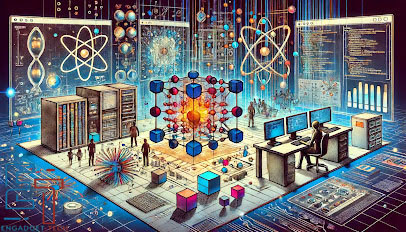Quantum Computing Technology

The Future of
Technology:
With this emergence of a more
data-driven world, classical computers are nearing their limits. Quantum
computing is emerging as an extremely transformative technology that is
expected to revolutionize the solution of complex problems in any industry.
Tapping on the principles of quantum mechanics, a quantum computer can process
things at speeds that are thought impossible today. All these future
technologies are going to change industries from cryptography and drug discovery
to AI and beyond.
What is Quantum Computing?

Quantum computing is based on the
principles of quantum mechanics, a branch of physics that studies the behavior
of particles at the smallest scales. Unlike the classical computer that
processes data in terms of binary, using either bits that represent 0 or
1, quantum computers use what are called Quantum Bits or Qubits.
Qubits are
unique because they exist in multiple states at one time, and this property
comes from two key phenomena: Superposition and Entanglement.
This has to do with superposition
and entanglement properties that allow a qubit to be in a 0, 1 state and both 0
and 1 at the same time. Entanglement has to do with interconnected two or more
qubits whose state is affected immediately upon the change of any state of one
qubit in relation to distance.

These properties make quantum
computers process a lot of information simultaneously, meaning for particular
kinds of problems, quantum computers are exponentially stronger than their
classical counterparts.
How Does Quantum Computing Work?
In its simplest form, a quantum
computer uses qubits to process and store data. A bit can only exist as a 0 or
1 in a classical computer, whereas a Qubit leverages superposition to exist as
both. This means that a quantum computer can explore all solutions to a problem
at once, whereas a classical computer would have to solve one solution after
another.
They are based on functions of
Quantum Gates, manipulating qubits in a manner that cannot be possible with the
classical gates. They facilitate the development of Quantum Algorithms used in
solving complex problems faster than by using algorithms classically. They have
the following ones:
Shor's Algorithm:
This algorithm was devised by
mathematician Peter Shor and factors large numbers far more rapidly than it
could possibly be done in a completely unreasonable amount of time for a
classical computer to do it. Relating Shor's algorithm to its applications,
many encryption schemes rely on the difficulty of factoring large numbers, so
this algorithm has real implications for cryptography.
Grover's Algorithm:
Grover's algorithm speeds up the
process of finding an unsorted database and therefore has a quadratic advantage
over the classical search algorithm. It finds application in many sectors like
database management, cybersecurity, and machine learning.
Another principle quantum
computers bank on is Quantum Interference: they filter out the wrong answers
and enhance the correct one, making computation accurate.
Major differences
between Classical and Quantum Computing:
1) Processing Power
Classical computers process data
sequentially using bits, whereas quantum computers are able to process multiple
pieces of information at once with the help of qubits. This gives quantum
systems an edge in handling large data sets or complex simulations.
2) Speed
Quantum computers might solve
problems exponentially faster compared to traditional computers since they can
exist in multiple states simultaneously. Certain tasks that will be
significantly more efficient on quantum systems include searching unsorted
databases, or factoring large numbers.
3) Problem Solving
Classical computers would be
useful for something like doing word processing or surfing on the internet, but
that is not what a quantum computer is built for-solving problems which are
much harder than the systems used these days. It includes an example like
simulating the chemical reactions or supply chains optimization which would
take completely unfeasible time within the existing systems.
Applications of Quantum Computing:
1) Cryptography and Security
Modern encryption schemes, such
as RSA, rely on the factoring of large numbers, which is currently considered
difficult. Quantum computers can potentially factor numbers using Shor's
algorithm, thus breaking such encryption schemes, and hence a new generation of
quantum-safe encryption methods needs to be developed. In contrast, quantum
computing also offers secure communication systems through quantum key
distribution (QKD), which relies on the principles of quantum mechanics to
guarantee theoretically unbreakable encryption.
2) Drug Discovery and Healthcare
One of the brightest promises of
quantum computing lies in molecular simulation. A quantum computer can simulate
what happens at the atomic level in molecules, giving researchers insight into
chemical reactions and biological processes. This will potentially speed up
drug discovery and lead to more effective treatments for diseases and further
understanding of complex biological systems.
3) Artificial Intelligence and
Machine Learning
Machine learning and AI
algorithms can supercharge through quantum computing. Quantum computers can
process enormous amounts of data much faster, accelerate the training of AI
models, and improve the precision of predictions. Breakthroughs would be made
in everything from natural language processing to image recognition and
autonomous systems.
4) Optimization Problems
Other areas where optimization is
extremely complex, such as logistics, finance, and telecommunications, involve
finding the best of many possible solutions. Quantum computers are great at
solving these problems by testing multiple solutions at the same time. This can
result in better supply chain management, optimization of financial portfolios,
and even traffic routing.
5) Climate Modeling and
Environmental Science
Quantum computing will alter
climate modeling, the simulation of complex environmental systems being done
much more precisely. In turn, it will enable scientists to gain better
understanding of climate patterns and environmental changes and therefore
design better strategies for combating climate change and designing solutions
that are sustainable for the future.
6) Financial Services
The financial sector will be
drastically affected concerning the ability to model risks and frauds more
quickly and accurately and optimize portfolios, since quantum computers will
analyze huge data sets which may not be easily detected by classical systems.
Current Challenges in
Quantum Computing:
1) Scalability
The number of qubits current
quantum computers can reliably keep is finite. Scaling up quantum systems with
stable, entangled qubits poses a particularly difficult challenge. More qubits
are more complicated to manage and control.
2) Error Correction and
Decoherence
Quantum systems are very
susceptible to environmental interference-even the slightest disturbance can
cause errors or destroy qubit states, a phenomenon known as decoherence.
Developing quantum error correction techniques that can detect and fix errors
without disturbing the quantum state is a prime area of research.
3) Cost and Accessibility
Building and maintaining quantum
computers are very expensive as well as complex processes in the current
systems, since most of them require such extreme conditions as near
absolute-zero temperatures. Therefore, with continuous development of
technology, there are more practical and cost-effective solutions yet to be
developed with respect to making quantum computers accessible to a wider circle
of industries.
The Future of Computing Technology:
Despite many challenges that need
to be overcome, the future of quantum computing is excellent. Several high-tech
companies, including IBM, Google, and Microsoft, have invested heavily in
quantum research, and governments around the world are funding quantum
initiatives.
Hybrid quantum-classical systems
will emerge shortly wherein the quantum computer is designed to collaborate
with a classical system toward solving a set of well-defined problems.
Cloud-based quantum computing platforms are starting to come online, providing
businesses and researchers with platforms to play around with quantum
algorithms without necessarily building out their own quantum hardware.
Conclusion:
Challenges such as scalability,
error correction, and cost remain; however, such rapid progress suggests that
quantum computing will soon become a powerful driver of the future of
technology. Quantum computers are to continue to expand, unlocking new
possibilities for innovation and driving new breakthroughs in a vast swath of
industries.









0 Comments